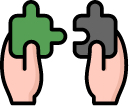May - Stroke Awareness Month
May – Stroke Awareness Month
Here at ISC, we recognise the importance of increasing our awareness and understanding of stroke and its impacts. This month, we have a story to share. Our team member, Paul Lumsden, is a stroke survivor, and his journey offers an insight into some of the challenges faced by those affected by stroke.
By sharing his story, we hope to highlight the realities of the side effects of stroke, particularly the hidden effects, which encourages more people to stay informed and supportive.
A Stroke Survivors’ Story – A New Beginning
30th March 2021, a Tuesday, and a typical post-Covid work-from-home day which kicked-off with a virtual meeting at which I was an agenda item. I was coming to the end of my presentation when I realised that I was finding it difficult to focus on the screen, my speech was becoming slurred, and I felt the right side of my mouth 'drooping'. My colleagues were none the wiser so, foolishly with hindsight, I decided to push on to finish the presentation. I came to the end and then became aware that I now could not move my laptop mouse with my right hand, in fact the whole of my right-hand side had ‘frozen.’ Luckily for me my daughter – a palliative care nurse at a children’s hospice – was at home so I called her to the study to try and communicate my difficulties, she called 999 without hesitation. She needed no explanations; she could see I was having a stroke.
Fast forward to the hospital admission and diagnosis, it was confirmed that I had suffered a Haemorrhagic Left Thalamic Stroke (try to say that after a glass or two of red!). It is a bleed on the brain, in the thalamus, which is your body’s ‘switchboard’ collecting all the information from your body’s senses (except smell) before sending it on to the cerebral cortex for interpretation and action.
Fast forward three days to my discharge from hospital and the continuation of the recovery process at home. The first few days after the stroke are critical to determining the extent of the recovery that is possible. Therefore, I focused all my efforts on the guidance given to me by the medical team and making sure I diligently completed my physiotherapy ‘homework,’ even the fine motor skills exercises, who knew that repeatedly picking up grains of rice with a pair of tweezers was essential therapy!
Six months or so later, I had reached a point where it was apparent that the recovery had gone as far as it was likely to go. It was then all about a learning process to recognise (physically and mentally) what was now realistic for me to achieve, on a day-to-day basis, in my home and work life.
Recognising and understanding the adjustments that needed to be made to evolve with my recalibrated capabilities would be fundamental to managing the potential mental health impacts – anxiety, depression, and lack of confidence.
I had played rugby for more than 40 years, running around the paddock every weekend during the playing season since the age of 12 (yes, I know, there will be some debate about the fact I have claimed I was running, especially in the twilight of my playing career!) however; the spasticity in my right-hand side – because of the stroke – meant that I could now muster little more than a sprightly walk. I worked hard on this physical aspect which has, over time, improved to a point where I am very confident, I will be able to get back on the rugby pitch once again, as a member of a walking rugby team.
The cognitive side effects were (and still are) the trickiest to manage, on a day-to-day basis. Cognitive effects are issues with the way the brain understands, organises and records information. This results in memory problems; difficulty with concentrating for any length of time; fatigue and speech disorder. I have good days and not so good days; the not so good days are usually a result of me being pig-headed and not taking things at a pace, so I do not get fatigued.
Attempting to explain to someone that it is not ‘tiredness’ but cognitive fatigue remains a challenge. It is important that families, friends, health professionals and the public understand what it means to live with these hidden effects so that they are not overlooked or neglected. If hidden effects are better understood, then stroke survivors are more likely to receive the right support at the right time.
I am extremely fortunate because I have been very well supported with my recovery and with the management of the ongoing impact to my day-to-day home and work life. Family & friends have played a significant part in the process as well as my employers who have been very accommodating with me adjusting my work schedule, when it has been necessary to do so. The Stroke information and support have provided an invaluable source of information and guidance, their work in the UK is vital to ensure that national stroke policies include support for the hidden effects of stroke.
#ThrivingAfterStroke

We listen to your needs

We understand your challenges

We provide solutions

We help with implementation
